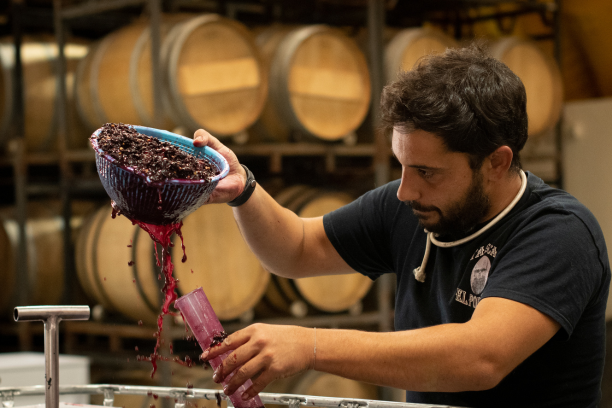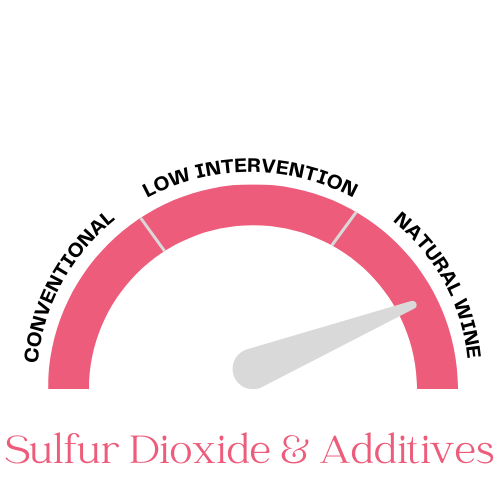The voice of Authentic Natural Wine What We Do
The Natural Wine Authority is a membership based community of natural wine growers, makers and sommeliers who contribute their expertise to achieve a common goal: to distinguish and promote genuine natural wines from those that merely use the term "natural" on their labels. We strive to ensure transparency for consumers and speak with a unified voice in our relentless pursuit of authenticity.
Our mission extends beyond defining natural wine; we actively publicize and market the natural wines of qualified producers who meet our international standard. This involves promoting qualified natural wines in stores, restaurants, events and placing advertisements across major social media platforms, all provided to natural winemakers free of charge.
Our objective is to ignite consumer interest and cultivate greater demand, thereby motivating distributors to purchase larger quantities of natural wine from qualified producers. This essential backing of authentic natural winemakers plays a pivotal role in growing their businesses and enhancing their brands around the world.
In addition to the promotional and marketing support we provide at no cost, we offer eligible wines a "Certified Natural Wine" accreditation, underscoring the exceptional status as the only internationally recognized natural wine certification within the industry. This certification is pending ISO 17065 recognition and enhances consumer trust by involving a comprehensive independent third-party inspection, evaluating vineyard management and natural winemaking practices.






















See How We Connect Producers to Distributors
Unlock exclusive importer and distributor connections by joining the Natural Wine Authority - We help qualified producers close deals with their ideal distributors through warm introductions and a community of guidance.
How To Become A Qualified Producer
Natural Wine Certification
Importers and distributors in the USA need assurance that the wines they procure are genuinely natural. Make your natural wines more attractive to all buyers with our independent third-party certification.




Certification Criteria
-
Scoring Weight: 45%
Soil used for producing natural wine should not be tilled and grapes should be carefully handpicked and cultivated according to Organic and/or Biodynamic standards.
______________________________
Organic standards mandate the exclusion of synthetic elements such as pesticides and fertilizers, emphasizing a more natural approach to cultivation. Biodynamic principles go further by treating the vineyard as a holistic ecosystem, considering cosmic influences as well.
Grapes designated for natural wine production undergo a distinct process. They are exclusively handpicked, a practice that requires meticulous attention to detail. This selection process is grounded in adhering to either Organic or Biodynamic standards, or both.
The combination of handpicking and cultivation according to these standards is central to crafting natural wine. It ensures a symbiotic relationship between human intervention and nature, resulting in a wine that mirrors the care put into its creation. This approach not only influences the flavor but also the ecological footprint of the final wine.
-
Scoring Weight: 20%
The wines must adhere to a maximum limit of 70ppm for total sulfur dioxide content and no additives should be used in production.
______________________________
Finished natural wines should stand subject to a stringent criterion: a maximum ceiling of 70 parts per million (ppm) for their total sulfur dioxide content. This limit underscores the commitment to ensuring that the wines maintain a delicate balance between preservation and the expression of their inherent characteristics.
Furthermore, a fundamental principle that guides the creation of natural wines is the deliberate exclusion of additives throughout the entire production process. This unwavering stance against the incorporation of supplementary elements serves as a testament to an unyielding commitment to the purest manifestation of winemaking artistry. By forgoing these additional substances, the objective is to grant paramount significance to the grapes and their innate components, thereby permitting the final wines to authentically mirror the terroir and the intricacies of the grape varietals from which they derive.
Consequently, the steadfast adherence to a sulfur dioxide content limit of 70 parts per million and the deliberate omission of additives during production collectively encompass the core of aspiring for genuineness and safeguarding the wine's distinctive identity. This underscores a dedication to crafting wines that not only conform to exacting standards but also encapsulate the very essence of the grape and the land from which it draws its origin.
-
Scoring Weight: 15%
Fermentation of the wine should occur using natural yeast strains that are native to the environment, as well as certified organic yeast. Enzymes should not be used during the production process.
______________________________
In the world of natural winemaking, the fermentation process is key. It's when the sugars in the grapes change into the flavors we taste in the final wine. In this process, the type of yeast used is very important.
For natural wine, using yeast that's already in the vineyard is crucial. These yeasts are there naturally and help the wine show the unique flavors of where the grapes are grown. This approach makes the wine taste more complex and connected to the environment.
Certified organic yeast can also be used. This yeast follows the same organic rules as the grapes, keeping everything consistent and natural. This is important because sometimes the natural yeast might not be enough or might behave in unpredictable ways, so using certified organic yeast helps keep things under control while still following the natural principles.
What's avoided in natural winemaking is using enzymes. These are chemicals that can be added to the grapes to help with fermentation. But in natural wine, the idea is to let the yeast and grapes do their thing on their own. By not adding enzymes, winemakers are staying true to the idea of keeping things simple and close to nature.
The choice of yeast and the decision to skip enzymes both play a big role in making natural wine what it is. It's all about letting the grapes and the yeast create the wine in a way that reflects where they come from, without too much interference.
-
Scoring Weight: 15%
The fining agents used should be vegan. Coarse filtration is allowed, but diatomaceous earth pads cannot be used.
______________________________
In natural winemaking, even the smallest details matter. The fining agents used need to be vegan, fitting with the idea of minimal manipulation and ethical choices. Coarse filtration, which removes larger particles from the wine, is allowed, but using diatomaceous earth pads for this is not allowed. This shows a commitment to sustainability, as diatomaceous earth is not environmentally friendly to extract. These rules reflect a deep dedication to making wine in a way that's respectful to nature, animals, and the environment.
-
Scoring Weight: 5%
Incorporating a social impact category acknowledges the broader influence of winemaking on workers, the environment, and local communities, emphasizing the need for ethical and sustainable practices.
______________________________
Integrating a social impact scoring category into the assessment of natural wines is essential to reflect the comprehensive ethos of sustainable winemaking. This category delves beyond the glass, acknowledging that the journey from vine to bottle involves more than just the final product.
Evaluating factors such as labor practices, carbon footprint, and the relationship between management and the vineyard acknowledges the broader impact of winemaking on people, the environment, and local communities. By asking questions about worker treatment, carbon emissions, and management proximity, we shed light on the social responsibility of producers and encourage a more holistic approach to crafting wines that not only delight the palate but also uphold ethical and sustainable practices.
Learn More By Downloading Our Whitepaper
-
Natural wine is wine made with minimal intervention in both the vineyard and the cellar. It emphasizes organic farming, native yeast fermentation, and a hands-off approach, resulting in authentic expressions of the grape and terroir. This can lead to unique flavors and textures, and slight variations between bottles are embraced as part of its artisanal character.
-
The growing interest in natural wine is exciting though it's also confusing since there isn't a standard way to define it. Since there aren't clear definitions, it's difficult to know if a wine is truly natural or not. This uncertainty makes people skeptical and leads to using the term incorrectly at times.
-
What goes into The Natural Wine Score is voted upon the Council of Natural Wine GEMS. Made up of Growers, Experts, Makers, and Sommeliers, the Council educates consumers through online coursework, promoting sustainability and appreciation for natural wines.
-
The Natural Wine Score evaluates crucial factors like viticulture, winemaking techniques, and additives, setting new international standards for natural winemaking.
-
Anyone who makes natural wine is encouraged to take our self-assessment survey to get their score. Through our certification process, The Natural Wine Score empowers consumers to make more informed choices and supports makers and growers who produce genuine natural wines.
-
The Natural Wine Score transforms winemaking, promoting authenticity and sustainability. High scores showcase dedication, fostering unity and international recognition. Consumers are empowered to make impactful choices for a thriving future of natural wines.

Leading The International Standard for Natural wine6 Pillars That Support The International Standard
Consistency and Clarity
Adopting the international standard provides clear and consistent guidelines for what constitutes a natural wine. It establishes common criteria, such as organic and biodynamic farming practices, minimal intervention techniques, and specific requirements for additives and sulfite levels. This consistency empowers consumers to make informed choices and enhances trust in the natural wine industry.
Global Recognition
With the international standard, natural wine certifications and labels gain global recognition. This recognition helps consumers identify and trust certified natural wines, regardless of their country of origin. It facilitates international trade and promotes the growth of the natural wine market on an global scale.
Safeguarding Consumer Interests
The international standard protects consumer interests by ensuring that natural wines meet certain quality and authenticity standards. It prevents misleading labeling or deceptive marketing practices, creating a level playing field for producers of all sizes and origins, fostering consumer confidence in the products they purchase worldwide.
Supporting Growers & Winemakers
The international standard benefits producers and winemakers who adhere to natural winemaking principles. It offers recognition and differentiation for their efforts, giving them a competitive edge in the market. Additionally, it fosters a community of like-minded producers who share a commitment to sustainable practices.
Geopolitical Advocacy
The Natural Wine Authority actively collaborates with industry stakeholders, organizations, and experts to promote discussions and initiatives aimed at defining universal guidelines. Through our efforts, we aim to drive positive change within the natural wine industry around the world and foster a global community committed to quality, transparency, and sustainability.
Advancing Sustainable Practices
The international standard encourages sustainable farming practices, biodiversity preservation, and the reduction of chemical inputs in vineyards. By establishing clear guidelines for organic and biodynamic farming, the international standard supports environmental stewardship and contribute to a healthier and more sustainable wine industry.





